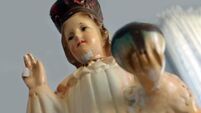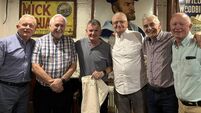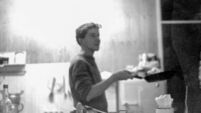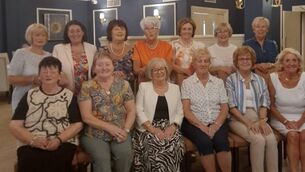A Cork hurling legend... and his career ended at 21
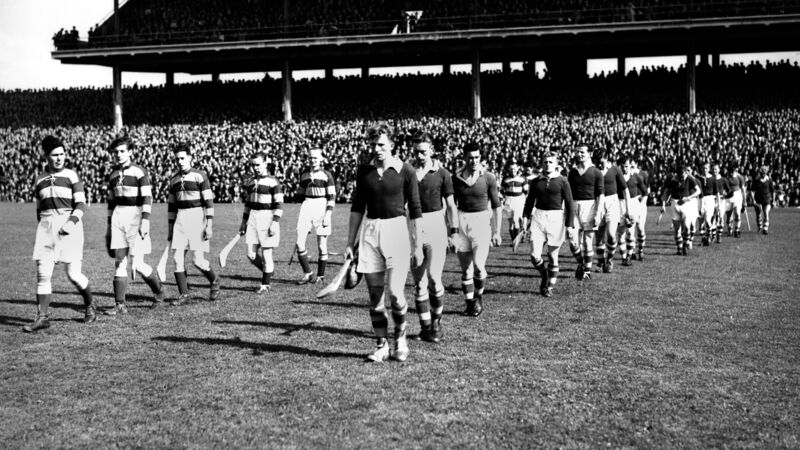
TEENAGE TALENT: Mick Kennefick leads the Cork team in the pre-match parade at Croke Park for the All-Ireland hurling final in 1943 against Antrim - he remains the youngest winning captain
HE starred for Cork in the 1942 All-Ireland hurling win and led St Finbarrs to that year’s county title, meaning he was Cork captain when they retained the All-Ireland in 1943.
This would not have been too unusual for one man, except for the fact that Mick Kennefick was still only a teenager.
To put this in perspective; if he was a young man in 2024, he would have been looking forward to being eligible to play his first adult game for St Finbarrs!
Born on July 14, 1924, Kennefick was no ordinary teenager. He had been a star hurler since he was old enough to swing a hurley. He grew up on Fair Hill and his father, Dan, hurled with the St Mary’s Club and won a Munster Senior Hurling medal with Cork in 1912.
Mick went to Gerald Griffin Technical School, an arm of the North Monastery School known as ‘The Tech’. His class submitted teams to the North Mon class leagues and entered the 1938 St Anne’s Street Leagues.
In 1939, the boys from The Tech invited friends in the Mon Secondary School, including John Lyons and Jimmy Lynam, to found a new club, Gerald Griffins. Most of the players were aged 13-15 and it was built around the athletic Mick Kennefick.
Gerald Griffins entered the new Cork City Bord na nÓg leagues and played established clubs like Glen Rovers, Lees, St Finbarrs, and the School of Commerce. They ended the year as winners of both the football and hurling leagues.
By 1940, however, several of the Gerald Griffins boys had begun work and they struggled to field a team. Mick had started work too, as an apprentice carpenter. The Kenneficks now lived on the southside, and in 1940 Mick joined St Finbarrs and was part of a super minor team that won that year’s county hurling crown.
The minor hurling team of 1941 was one of the strongest Cork ever fielded. Mick starred at centre-forward. Alongside him were Sean Condon, Joe Kelly, Tom Mulcahy and Jim Morrison, and they defeated Galway 3-11 to 1-1 in the All-Ireland Final.
Mick was eligible to play minor again in 1942 but the competition was suspended in the depressed ‘Emergency’ era.
Several of that 1941 minor team would make the jump to the Cork senior hurling team, but none made the dramatic impact that Mick Kennefick did in 1942.
Cork were defending All-Ireland champions and hopeful of a repeat in 1942, but would have to overcome Limerick - the 1940 champions had lost to Cork in the 1941 Munster semi-final without Mick and John Mackey. The former was regarded as the best hurler in Ireland, and he and John formed a lethal half forward line.
The Mackeys were back when Limerick met Cork in the 1942 Munster semi-final. The big question on Leeside was who would mark centre forward, Mick Mackey? Many felt Din Joe Buckley was the man, but that is not what happened.
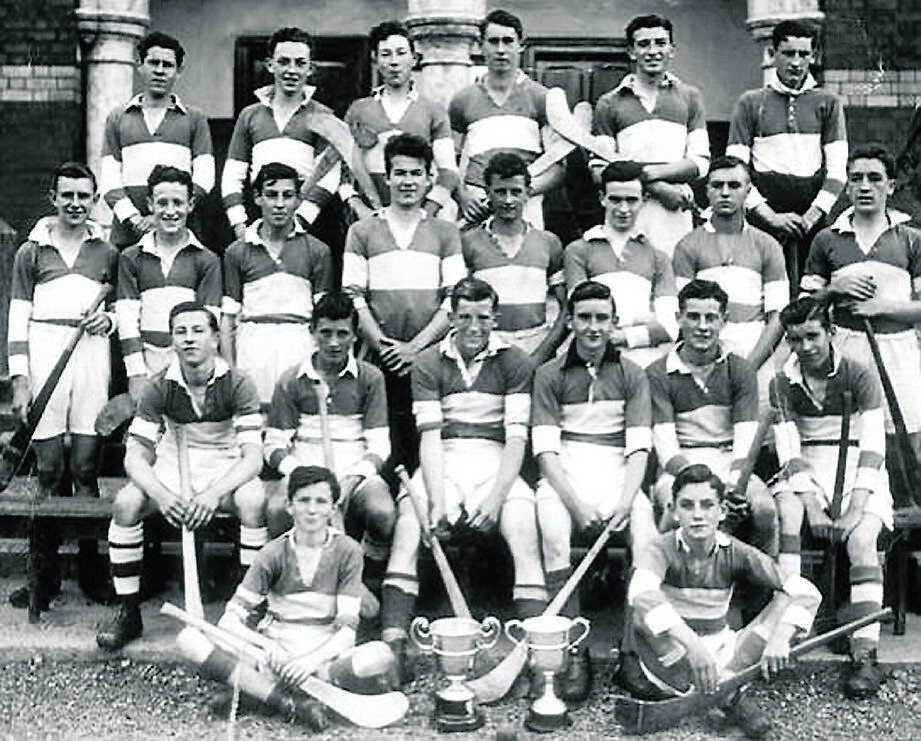
Jack Lynch, as Cork captain, was present at 8pm when the selectors sat down to pick the team. They finished five hours later. During their deliberations, Lynch argued strongly for the still 17-year-old Kennefick to mark Mackey. He eventually got his way; Kennefick lined out at centre back.
The game was a thriller, and Kennefick repaid Lynch’s faith with a masterful display. Cork won by two points and went on to beat Tipperary in the Munster Final and Dublin in the All-Ireland final, when the young Kennefick won his first All-Ireland senior medal.
In October, 1942, Mick won his first senior county hurling medal with St Finbarrs, who beat Ballincollig 5-7 to 2-2 in the final. Of the three Barrs’ men who played for their county, Kennefick had the longest service, and thus became Cork’s de facto senior captain for 1943.
After a facile win over Kerry that year, Waterford made Cork work hard in the Munster Final. The Rebels won 2-13 to 3-8. with Kennefick at right half forward, and went straight into the All-Ireland final.
They faced an unknown quantity, Antrim, who had nevertheless defeated Galway and Kilkenny to get to the final. Kennefick, who had turned 19 in July, switched to left half forward position.
Before the game there was an exchange of gifts between the two captains, which reflected the state of the country in the ‘Emergency’ years. Antrim captain Jim Walsh presented Kennefick with some tea and Kennefick responded by presenting Walsh with some Cork butter.
After the exchange came the reckoning. The Cork Examiner reported: “The story of the game can be briefly told. The Cork team showed about 50% improvement since they beat Waterford, and it was obvious from the throw-in that they were in magnificent fettle.”
Cork won 5-16 to 0-4 and Kennefick earned a place in the record books as the youngest player ever to captain his county to the All-Ireland senior hurling title.
He was 19 years and 52 days old and remains the youngest ever captain, a record that may never be beaten.
Another senior county medal followed in November and it looked like Kennefick was on the way to a legendary career, but fate was to put him on a different path.
He broke his wrist badly when Cork beat Tipperary on June 25, 1944, and missed out as they won a fourth successive title, against Dublin. Sadly, the injury did not heal sufficiently to allow him to hurl. Kennefick’s playing days were over at just 21.
The mark of a man is said to be when he meets “with Triumph and Disaster and treat those two imposters just the same”.
Kennefick turned his attention to his trade. A carpenter with Sisk, he worked on various buildings including the Capitol Cinema. He married Theresa Crowley of The Lough and started a family.
In 1959, Kennefick decided to change his career. He enrolled on a woodwork teachers course in Gorey Technical School, Co Wexford, and when he qualified, he found a job in Partry, Co Mayo.
This required Mick, Therese and their six children, at that time, to move to Mayo. From there he went to Kiskeam Technical School in North Cork and became Principal. When that closed in 1971, Kennefick was posted to Midleton and moved back to live in Glasheen. Now he was back within walking distance of St Finbarrs, he got involved with GAA again and became coach to the Barrs’ senior team.
“The Barrs had a very good team at that time, but we had failed to win the county for five years, and fellas were getting frustrated. Mick Kennefick brought a great calmness to our set up,” said Denis Burns, a Barrs player at that time.
That calmness proved to be the missing ingredient and he coached St Finbarrs to win the Cork County, Munster and All-Ireland club titles in 1974/75.
Kennefick was chairman in 1977 when the Barrs repeated their successes of 1974. They had a big win over Glen Rovers, 1-17 to 1-5, in the county final before a record crowd of 34,151. A source of great pride to Mick was that his son, Niall Kennefick, played at centre back. The Barrs also went on to win the All-Ireland title.
That began a golden era as the Barrs won four successive county titles from 1980. The 1984 county final win against Ballyhea was to be the last Mick Kennefick attended. He died suddenly on December 20 that year, aged just 60.
There can be little doubt that Kennefick was one of the best hurlers of his generation. He was strong, athletic and skilful. His career was short and goodness knows what he might have achieved if fate had not intervened.
It was how he handled his fate that marked him out as exceptional. His legacy is not that he was a hurler and the youngest ever winning All-Ireland captain. He was also a first class carpenter, a husband, father of nine children, a teacher, a coach, and chairman - and he did it all in 60 years.
The story of Mick Kennefick is the definition of success.
